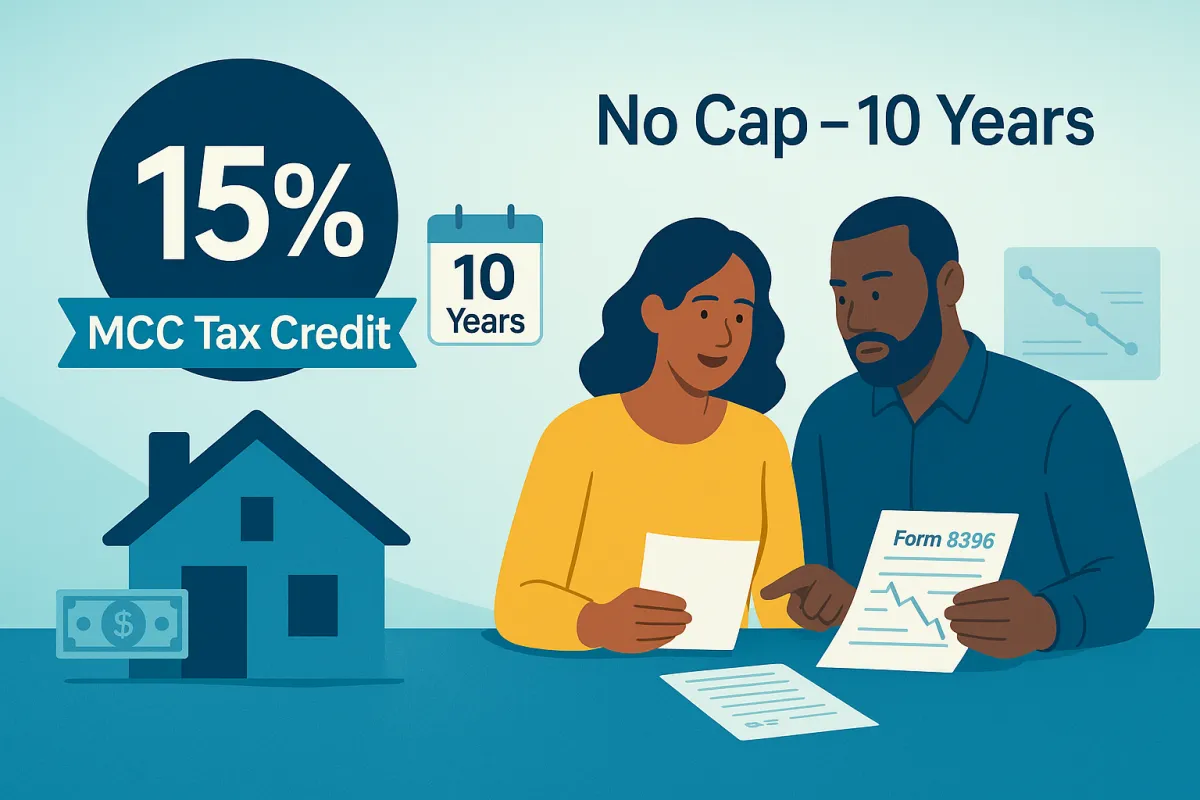
15% MCC Tax Credit
The 15% MCC Tax Credit (No Cap): How It Works, Who Qualifies, and Why It’s a Big Deal
If you’re a first-time buyer (or buying in a targeted area), a Mortgage Credit Certificate (MCC) can be the quiet MVP of affordability. Our program gives you a federal income tax credit equal to 15% of the mortgage interest you pay each year—with no $2,000 cap, for 10 years. That’s a true, dollar-for-dollar reduction of your tax bill that can translate into meaningful monthly cash-flow.
What exactly is an MCC?
A federal tax credit, not a deduction. Every dollar of MCC credit reduces your federal tax liability by a dollar (subject to how much tax you owe).
Your program specifics: 15% of annual mortgage interest, no cap, available for 10 years.
Nonrefundable with carryforward. If your credit is larger than your tax bill this year, you can generally carry unused amounts forward up to 3 years.
Filed annually. You claim it each year on IRS Form 8396.
Works with common loan types. Conventional, FHA, and VA are typically eligible (final eligibility depends on the issuer’s rules).
Why it’s valuable (in plain English)
Immediate, repeatable savings: You get a credit every year you’re eligible, while you live in the home and the MCC is in effect.
Monthly cash-flow option: Instead of waiting for a refund, many buyers adjust their W-4 so the expected credit shows up in each paycheck (coordinate with a tax pro).
“Effective interest cost” lens (illustrative): Because the credit equals 15% of interest paid, many people think of it as reducing the cost of interest by ≈15%.
Example: 7.25% note rate → interest-cost equivalent ≈ 7.25% × (1 − 0.15) = 6.16%.
Important: Lenders still qualify you at the note rate and payment. This “effective” view is only to explain the benefit.
Quick, realistic savings examples
Assumes 30-year fixed, P&I only. Actual results vary with your amortization schedule and personal tax situation.
$400,000 at 7.00%
Estimated P&I: $2,661/mo
Year-1 interest: ~$27,871 → Year-1 MCC: ~$4,181 (≈ $348/mo if you adjust withholding)
10-year interest: ~$262,595 → 10-year MCC total: ~$39,389
$300,000 at 6.50%
Estimated P&I: $1,896/mo
Year-1 interest: ~$19,401 → Year-1 MCC: ~$2,910 (≈ $243/mo)
10-year interest: ~$181,873 → 10-year MCC total: ~$27,281
$500,000 at 7.50%
Estimated P&I: $3,496/mo
Year-1 interest: ~$37,344 → Year-1 MCC: ~$5,602 (≈ $467/mo)
10-year interest: ~$353,504 → 10-year MCC total: ~$53,026
Why Year-1 looks largest: As your loan amortizes, interest (and therefore the credit) declines each year—but the 10-year total is where this really shines.
Who typically qualifies?
Program details vary by issuing agency, but most MCC programs follow these themes:
First-time homebuyer (no ownership in a principal residence in the last 3 years).
Common exceptions: purchases in targeted areas and qualified veterans.
Household income and purchase-price limits (often higher in targeted areas).
Primary residence you will owner-occupy; eligible property types may include single-family homes, some condos/townhomes, etc.
Pairing rules: MCCs are usually standalone and generally not combined with tax-exempt bond first-mortgage programs on the same loan.
Timing matters: The MCC must be issued at or before closing by a participating lender.
Ask us for the current income/price limits and targeted-area map for your purchase location.
How to capture the benefit
Get issued at closing. Your lender coordinates the MCC with the housing finance agency.
File Form 8396 annually. Track any carryforwards from year to year.
Consider a W-4 adjustment. With a tax pro’s guidance, you can realize the credit monthly.
Refinancing later? You can typically request an MCC reissue to keep the benefit (subject to rules).
Common questions
Does the MCC change my mortgage rate or payment?
No. It reduces your federal tax—you still qualify and pay based on the note rate.
Can I use it with FHA or VA?
Often yes, but always verify with the specific program’s eligibility rules.
What if my credit exceeds my tax bill?
The MCC is nonrefundable, but you can usually carry forward unused amounts up to 3 years.
Will I lose my entire mortgage-interest deduction?
No. If you itemize, you reduce your mortgage-interest deduction by the credit amount you claim (you can still deduct the remaining interest).
Could there be “recapture tax”?
Possibly if you sell within certain time frames and meet income/gain conditions. We’ll provide the disclosure and walk you through the thresholds so there are no surprises.
The bottom line
A 15% uncapped MCC for 10 years can put thousands of dollars back in your pocket—every year—without changing your mortgage rate. It’s one of the most under-utilized affordability tools for eligible buyers.
Ready to explore your numbers?
Tell us your price, down payment, and rate and we’ll create a custom 10-year MCC savings summary (including a simple “effective interest-cost” illustration) you can use to plan your budget and next steps.
Disclaimers: This article is for informational purposes only and not tax or legal advice. Program terms, eligibility, and fees are set by the issuing agency and may change. Always consult a qualified tax professional to confirm your eligibility, W-4 strategy, and the amount of any credit.


Branch: Canopy Mortgage - TLC Group - 13809 Research Blvd, Ste 500, Austin, TX 78750 | Office #512-598-9093 | NMLSConsumerAccess.org #: 1359687 | Equal Housing Lender -All loans subject to credit and property approval.
Consumers wishing to file a complaint against a banker or a residential mortgage loan originator should complete and send a complaint form to the Texas department of savings and mortgage lending, 2601 North Lamar, suite 201, Austin, Texas 78705. Complaint forms and instructions may be obtained from the department’s website at www.sml.texas.gov. A toll-free consumer hotline is available at 1-877-276-5550. The department maintains a recovery fund to make payments of certain actual out of pocket damages sustained by borrowers caused by acts of licensed residential mortgage loan originators. A written application for reimbursement from the recovery fund must be filed with and investigated by the department prior to the payment of a claim. For more information about the recovery fund, please consult the department’s website at www.sml.texas.gov. State Licenses page, Privacy Policy, and Terms of Use


Facebook
Instagram
LinkedIn
Youtube
TikTok